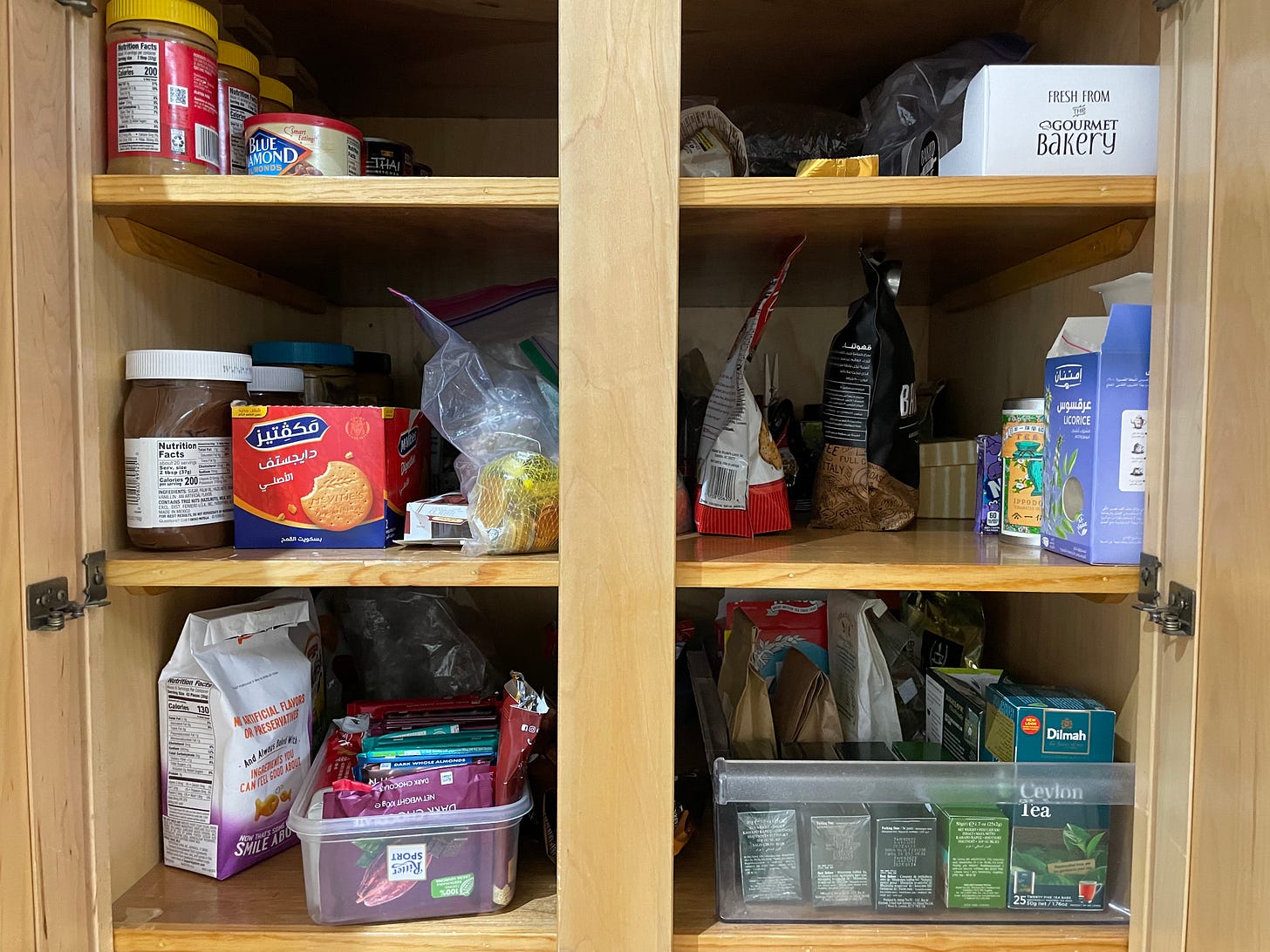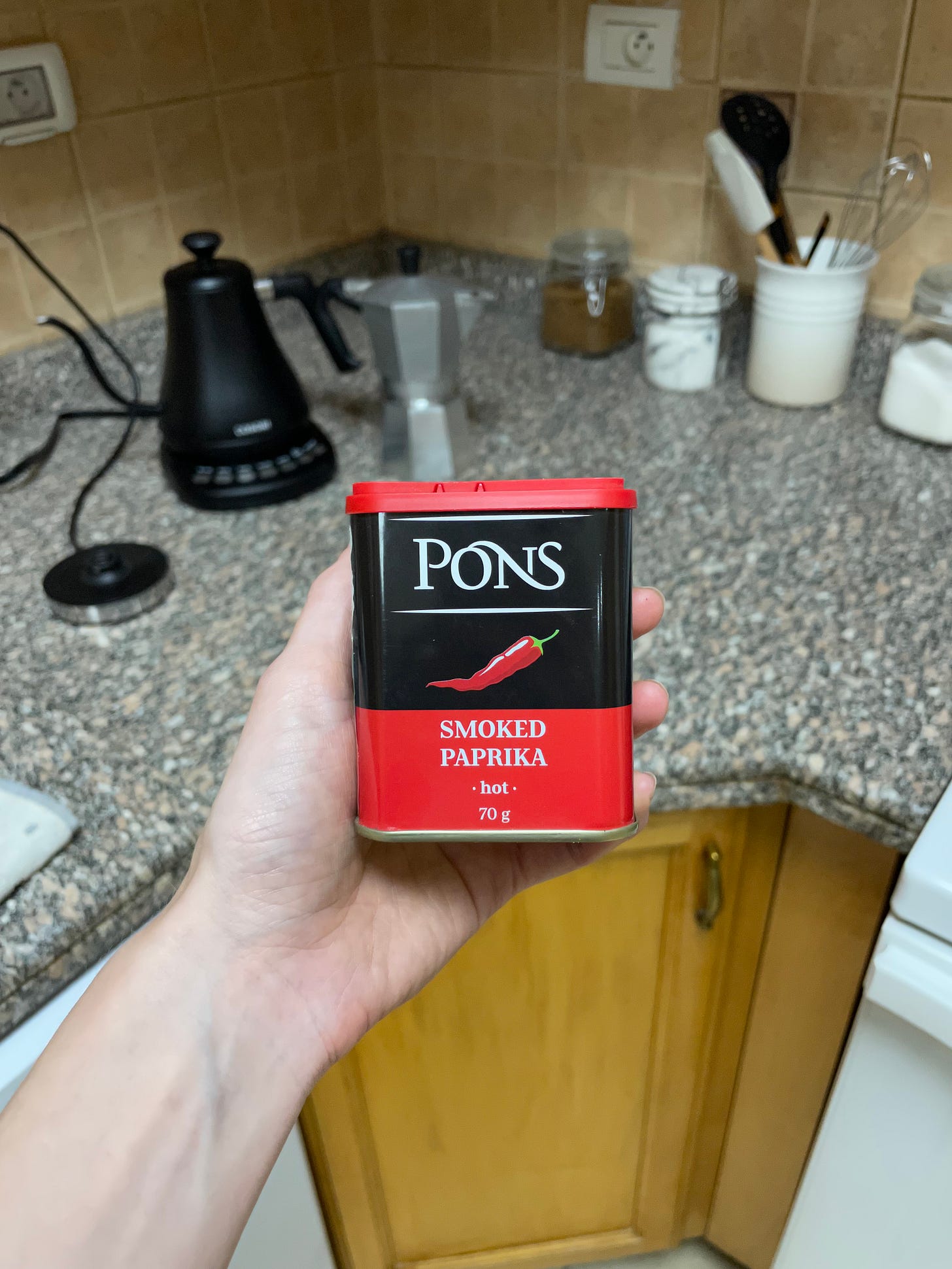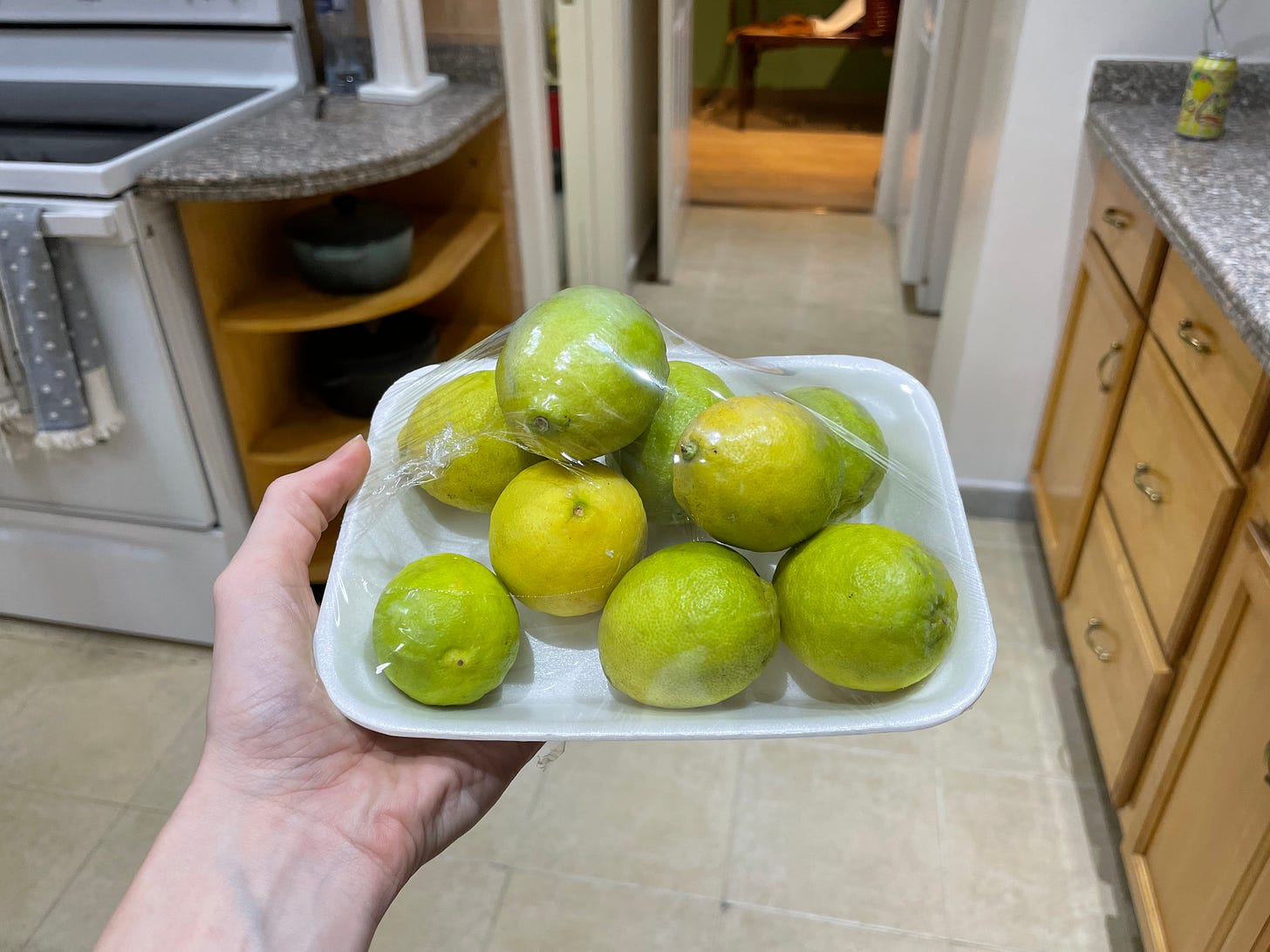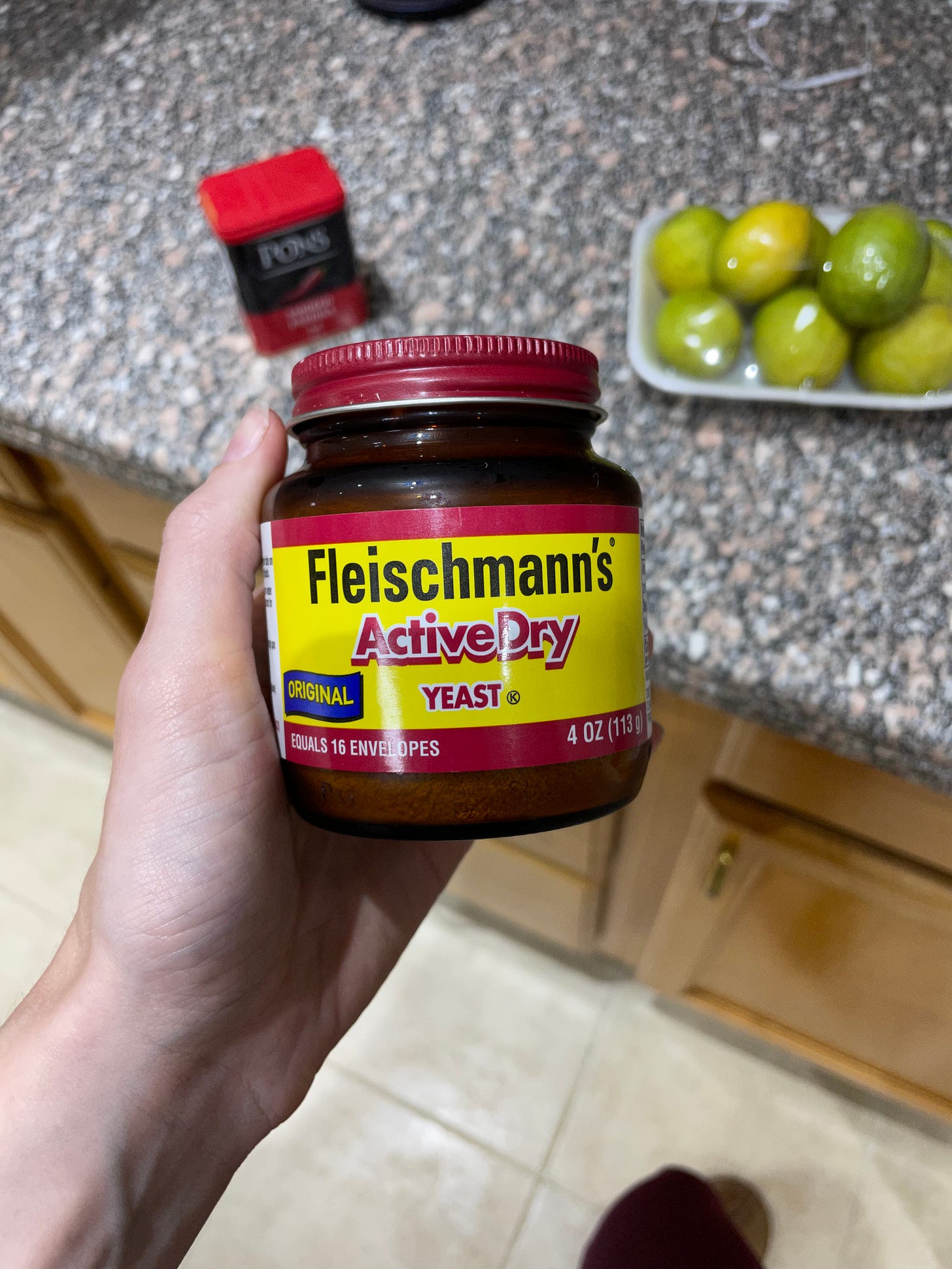Kitchen Cupboards #7: Samantha Childress, The Cairo Dispatch
The American expat and travel writer in Egypt who orders ingredients via delivery apps and on WhatsApp (!)
Welcome to Kitchen Cupboards, a monthly ingredient column where, rather than exploring some of my favourite ingredients, I’m taking a peek into some of my favourite food writer, creators and producers kitchen cupboards to talk about which ingredients shape their everyday cooking.
Now, this interview you’ll find below I just knew I could not keep just for paid subscribers. I love you guys and you make ingredient possible, but I found it so fascinating I thought it would be a great way to showcase exactly what I want to achieve with Kitchen Cupboards, sharing different and unique kitchens and perspectives from around the world that this month I’ve lifted the paywall and made it accessable to all. But, if you don’t want to miss out on next months interview + you want to gain access to the entire ingredient recipe archive, do become a paid subscriber below!
My kitchen is not the same place it would be if I’d not have lived abroad. I grew up in and out of first my grandparent’s South of France kitchen where I developed my view that French supermarket pasta tastes better than the British stuff, meaning you’ll find it in my cupboards to this day, and then in my parent’s one in the North, where the local Fleur de Sel became a thing I’d never again stock a kitchen without. And this is just my focus on ingredients; living in California has injected a freshness and undercurrents of both Korean and Mexican flavours into almost everything I make.
This is why I’m particularly fascinated by expat kitchens where an adherence to habit and the comforts of home meet the excitement of the unfamiliar and new. It is also why I’m super excited to be virtually stepping into the kitchen of
, the American-in-Egypt travel writer behind on of at times the most fascinating, and at times most emotionally touching newsletter I subscribe to: .I could give you Samantha’s biography here, talking about her high flying career in Washington and her many, many achievements, but her writing is not about that; it may be her own personal creative outlet in the writing, but in sharing her words with others she is helping open up their worlds. Instead of a biography, then, here are a few pieces of hers you should cut your teeth with before you hit subscribe:
Portuguese Fado, A Bewitching Experience I'll Never Have Again (a beautiful piece about why you should never try and recreate perfect experiences)
A Trip To Garbage City (a story about an experience which will make you re-address your perspectives when travelling outside of the West)
The Stranger in Paris Who Stood Up to the Nazis (on a chance encounter with someone who has seen too much in life, which made me cry)
Seven Rules of Oktoberfest, A Very Orderly Drinking Binge (and informative and funny travelogue which has put Oktoberfest firmly on my bucket list)
How do you shop both for store cupboard items and for everyday ingredient essentials? Smaller grocery stores, bigger ones? Markets? Online? I know the sumptuously photographed photos of sprawling markets in glossy Western cookbooks may not necessarily be the reality of what it is actually like to shop for your dinner? I notice lots of American brand products in your pantry, and most of the jars are in English, not Arabic? (Though McVities Digestive Biscuits seem universal!)
When we first arrived in Egypt, we bought some spice packets at one of the big shops in the Khan el Khalili where they have open baskets heaped with spices, which was very romantic and picturesque... but we haven't really done that since! In my neighborhood, there are small grocery stores, large grocery stores, and plenty of vegetable stands, so I can take my pick. One of my favorites is a store called Gourmet, which is a mix of local and imported products. They have fresh milk (there's a small producer here called The Milkman that literally milks the cows, bottles, and delivers to grocery stores the same day), excellent veggies, a good selection of meats, and European cheeses. There's also a place called Oscar that I would describe as somewhere between a regular grocery store and a Costco.
We mostly get groceries delivered, though, through an app called InstaShop. You can get just about anything delivered in Cairo if you know the right person to text on WhatsApp! It actually induces a sort of learned helplessness, because there are people to do everything for you. There is a meat guy that a lot of the Americans here like because he does pork (this being a majority Muslim country, most people don't eat pork, but there is a large Christian minority that does) and will bring it straight to your door. Traditionally, a lot of Egyptians simply knew someone at their local grocery store, and each week they would call that person with a list of what they needed. That person would then shop and deliver for them. Over time they would come to understand the customer's needs and preferences, so even if something was out of stock, they knew what to replace it with.
My husband and I are also very lucky in that we have access to a commissary, which is basically an American grocery store for embassy employees. That's why you see a lot of American brands in my cupboards (though interestingly, a lot of the brand names here are in Latin script, even on local products)! We shop at the commissary a lot less than most American families—we try to go no more than once a month. That's when we stock up on snacks and La Croix. We buy all our produce locally, as well as almost all our meat, dairy products, flour, pasta, and most spices.
Arriving in Egypt, what ingredients did it surprise you were different or that you’ve had real difficulty getting hold of?
Aside from the obvious answer of "pork and alcohol" ... :)
Crackers. I have never found a good locally-made cracker, even at fancier grocery stores. It had never occurred to me that crackers would be a regional item, because they seem so basic to me! Pretty much all the crackers we buy are imported, and they're difficult to find outside the commissary.
Cheddar cheese. I have tried local cheeses that claim to be cheddar, but they're not quite right--both the texture and flavor are a little different, and tread closer to Kraft singles territory than the sharp, hard-and-slightly-crumbly cheddar I like. So this is another commissary item for us.
Brown sugar. This is an import and best found at the commissary. What little is available locally can be really expensive. I once ran out of brown sugar in the middle of baking Deb Perelman's chocolate olive oil cake, so I ordered a box of what I thought was brown sugar from a local brand. I opened it to find about a hundred individual packets of raw sugar, ha! Picture me ripping open fifty of those paper packs and pouring them one by one into cake batter...
Coffee. Nick and I strongly prefer whole beans, which can be tough to find here. You really have to go to a specialty store for it. That said, there is a lot of great coffee on the local market. Turkish coffee grounds (i.e. the ones that are really fine and often have cardamom added) are what falls in the middle of the Venn diagram between "tastiest" and "most widely available," in my experience.
Yeast. It’s widely available, but sometimes there are additives in it—I once opened a pack to find it was cut with sugar!
Groceries are also more seasonal here, so you can't necessarily find any type of produce you want at any time of the year like you can in the US or UK. And I'd be remiss if I didn't mention that I have it much, much easier than most Egyptians in terms of what I can get my hands on. Food prices have been soaring here and there have been shortages, due to a combination of devaluations of the Egyptian pound, massive inflation, and Russia's invasion of Ukraine (Egypt is one of the biggest importers of wheat, while Ukraine is one of the biggest exporters... I think wheat harvests are a low priority for Ukrainians right now relative to their fight to remain independent, so Egypt's ability to import wheat has suffered). Eggs, for example, cost the equivalent of about $2.60 for 15, which is completely insane in a country where the minimum wage is a little less than $90/month. I once got eggs delivered that were so small I suspect they were actually quail eggs being passed off as chicken eggs.
What sort of cooking do you do at home? Do you stick to American classics, do you cook much local food, or is it a mix of everything you’ve loved and eaten on your travels?
Nick and I don’t cook a ton of local food, because honestly, it’s cheaper to eat out! One of our favorites, koshary--an odd marriage of rice, pasta, chickpeas, fried onion, and tomato sauce that tastes a lot better than it sounds--can be had for 18 Egyptian pounds, or about $0.81. A lot of Egyptian food is labor-intensive and the recipes are written with the idea of feeding a large group or a multi-generational household, so it doesn't always make sense when you're cooking at home for two. I once took an Egyptian cooking class where we made koshary... while it was delicious, the recipe fed twelve, and given the ingredient proportions, I don't think it would scale down well.
What we make is definitely a mix of American classics and things we’ve eaten and loved while traveling. We like making Japanese katsu curry--that's an easy weeknight staple for us. Some other dishes we always fall back on are big salads with cucumber, red pepper, chicken strips, and yogurt dressing; shepherd's pie; carbonara; instant pot butter chicken; burgers; and pizza, now that I've more or less perfected my dough. We keep it fairly simple, but we do enjoy having a large rotation of recipes so we don't get bored.
We also love trying new spices that we pick up on our travels. We snagged some piri piri salt on a recent trip to Portugal, so I've been sprinkling that over all our veggies lately. My sister-in-law, who lives off the grid on a homestead in Guatemala, gave us some local pepitoria spice for Christmas, so that's been a fun addition as well! We picked up a shaker of Japanese seven spice after traveling to Japan years ago, but I still haven't figured out how best to use it. (Rachel: I’ve sent Sam this Diana Henry recipe for Japanese chicken with a smashed cucumber salad from her book A Change In Appetite which is an old favourite for the spice blend!)
Are there any ingredients you now always keep to hand you discovered in Egypt that you never want to be without again?
Dried hibiscus flowers! They make such delicious juice. It's incredibly refreshing in summer and it's protein-heavy, so it feels nourishing.
Also, not really an ingredient, but Ahmad and Dilmah brand teas. They are the best, especially for the price.
Finally, there's a brand of kettle chips here called Raw that I've never seen anywhere else, and I'm already dreading the day we leave Egypt and I have to give those up. They have the perfect balance of slight oiliness and crunchiness, and they come in the best flavors. My favorite is the sweet chili flavor because it's so interesting, but the cheddar cheese and shallots flavor is a close second--ironically, since there is no real cheddar cheese here!!-- and the hickory smoked are the best barbecue chip I've ever had (sorry, Lays!). Now I'm hungry for chips...
And finally, which 5 ingredients in your kitchen cupboards would you simply not be able to live without, and why? Do you have specific favourite brands, and ways to use them?
Smoked paprika: It MUST be smoked. Regular paprika just doesn’t pack the same punch. I have met few savory dishes that couldn’t be improved by a dash of smoked paprika. I put it on veggies and sprinkle it over mac and cheese. You will notice my spice cabinet is full of tins of regular paprika… these were all mistakenly included in grocery deliveries instead of smoked paprika, so have sat in my cupboard unused for years!
Fresh lemons: Because I have a sulfite allergy, I can’t use most vinegars. One of the great tragedies of my life, honestly. I use fresh lemons in homemade dressings, sauces, and pretty much any recipe that calls for vinegar! The lemons here in Egypt are different. They tend to be small and green like limes, but they still have a wonderfully tart, lemon-y taste. They make the most incredible lemon bars. (I wrote a long rant about Egyptian lemons in my newsletter a couple months ago. Rachel: This was the first essay of Samantha’s I read and what made me hit subscribe on her newsletter!)
Yeast: I make homemade pizza dough a lot, because I think pizza is one of the easiest weeknight dinners, and the dough freezes well. I also need yeast for two of my favorite desserts to make: cardamom buns and chocolate babka.
Soy sauce: This is another staple for making homemade sauces sans vinegar. I’ve figured out a pretty good Worcestershire sauce dupe that is excellent in a shepherds pie. I try to use the Kikkoman low sodium version.
Parmesan cheese: Another ingredient that makes so many dishes better. I put it on pasta, on top of roasted eggplant, over crispy eggs… and I use it for carbonara when I can’t find grana padano or pecorino romano. (I also use bacon when I can’t find guanciale, which could probably get me arrested in Italy.)













Intrigued by the Turkish coffee with cardamom (I’ve been on a cardamom kick lately). Any recs?
Great post! Thank you.